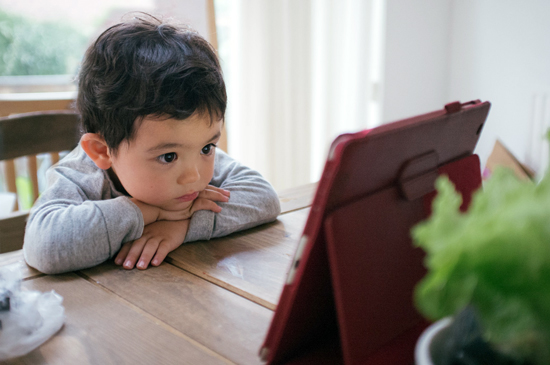Study Shows What Happens To the Brains of Kids Who Use Tablets

How often do you see kids using iPads, iPhones, and any other touch screens? Technology has slowly but surely become deeply engrained within society, and some schools are even distributing touch screen tablets to students to use while in class. They’re convenient, paperless, and extremely relevant given that you practically need to know how to use technology in today’s society. However, are there any downsides to children using touch screens, especially for prolonged periods of time?
A study published in Scientific Reports in 2017 examined the effects of frequent touch screen use in children. Their findings suggest that increased usage may negatively affect children’s sleep patterns.
Details of the Study
The researchers sent an online survey to 715 UK-based parents asking for details of their children’s media usage, including television and touch screen time, and their sleep routines (whether they sleep during the day and/or night, average sleep duration, the amount of time it takes for them to fall asleep, and how often they wake up mid-sleep). The researchers found a positive correlation between increased touch screen usage and sleeping problems in infants and toddlers.
More specifically, the study found that kids using touch screens often had difficulty falling asleep at night, would sleep for less time during the night, would sleep more during the day, and slept less overall. The researchers did not find a correlation between touch screen usage and the number of times children wake up during the night.
The researchers stated that “every additional hour of touchscreen use is associated with an overall reduction in sleep of 15.6 minutes”.
Of those surveyed, 75% of parents stated that their toddlers, aged between 6 months old and 3 years old, use touch screens every day. Interestingly enough, other studies have also had similar results, regardless of social status and income levels. The frequency of daily usage certainly increases with age, as the study found that statistics jumped from 51% for 6 to 11-month-old infants to an astonishing 92.05% by 25-36 months old toddlers.
So, what about the other 25% who don’t use touch screens every day? Well, only 42% of those children were said to never have used them before, meaning that many of these kids could still use them on a regular basis, just not daily.
In terms of how much time the daily users are actually on these touch screen devices, the amount of time increases with age. Parents reported that their infants aged 6-11 months would use their devices for fewer than 10 minutes per day, whereas toddlers aged 26-36 months old would use them for an average of 45 minutes per day.
Most studies on technology and its impact on sleep are conducted on older children or adults, making this study a worrying landmark, and there are no long-term studies available because this technology is still so new.
Evidence That Using Screens Affects Our Sleep
This information isn’t necessarily surprising, as many studies have been performed on the effects of increased screen time and sleeping patterns of adults. Most studies have found a correlation between increased electronic screen time and shorter total sleep time as well as later bedtimes.
Two of the issues with using screens frequently is exposing yourself both to EMFs (possible carcinogens) and to blue light. Exposure to blue light at night can make people more alert and affect their circadian timing. In fact, exposure to any bright light can affect your sleep because it delays onset of the sleep hormone melatonin, but blue light is the most detrimental to our health. It’s important to note that this can affect children, including teenagers, more than adults, though everyone should avoid blue lights prior to sleeping.
Harvard University wrote: “Study after study has linked working the night shift and exposure to light at night to several types of cancer (breast, prostate), diabetes, heart disease, and obesity.”
A Harvard study found that blue light can suppress melatonin for approximately twice as long as green light, and can shift circadian rhythms by twice as much (three hours in comparison to one and a half). Another study conducted by the University of Toronto found that blue light is extremely efficient at suppressing melatonin, which is crucial for sleep.
Final Thoughts
In a world where technology is engrained into society and necessary to use for many if not most jobs, it’s unrealistic to suggest kids shouldn’t use technological devices. While you can monitor their time on these devices or choose not to expose them early on, it’s almost inevitable that they’ll eventually use them just as frequently as most people do now.
What’s important is that we encourage children to disconnect from technology, at whatever age, and also encourage one another to do so. We are so glued to our phones sometimes, and your children will probably take note of that. Do we really want to normalize 24/7 technology usage?
Encourage your kids to go outside and play, and go on those adventures with them! It’s important that we take some time to focus on ourselves, our families, our lives, and whatever else that’s important to you, that exists outside of the technological realm.
yogaesoteric
November 15, 2018
Also available in:
 Français
Français
